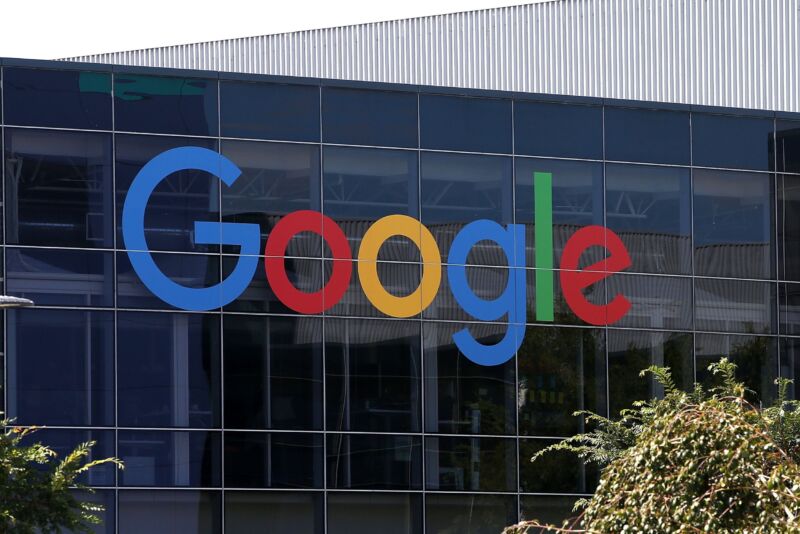Google gets a bench trial after sending unexpected check to Justice Department.

Google has achieved its goal of avoiding a jury trial in one antitrust case after sending a $2.3 million check to the US Department of Justice. Google will face a bench trial, a trial conducted by a judge without a jury, after a ruling today that the preemptive check is big enough to cover any damages that might have been awarded by a jury.
“I am satisfied that the cashier’s check satisfies any damages claim,” US District Judge Leonie Brinkema said after a hearing in the Eastern District of Virginia on Friday, according to Bloomberg. “A fair reading of the expert reports does not support” a higher amount, Brinkema said.
The check was reportedly for $2,289,751. “Because the damages are no longer part of the case, Brinkema ruled a jury is no longer needed and she will oversee the trial, set to begin in September,” according to Bloomberg.
The payment was unusual, but so was the US request for a jury trial because antitrust cases are typically heard by a judge without a jury. The US argued that a jury should rule on damages because US government agencies were overcharged for advertising.
The US opposed Google’s motion to strike the jury demand in a filing last week, arguing that “the check it delivered did not actually compensate the United States for the full extent of its claimed damages” and that “the unilateral offer of payment was improperly premised on Google’s insistence that such payment ‘not be construed’ as an admission of damages.”Advertisement
The government’s damages expert calculated damages that were “much higher” than the amount cited by Google, the US filing said. In last week’s filing, the higher damages amount sought by the government was redacted.
Lawsuit targets Google advertising
The US and eight states sued Google in January 2023 in a lawsuit related to the company’s advertising technology business. There are now 17 states involved in the case.
Google’s objection to a jury trial said that similar antitrust cases have been tried by judges because of their technical and often abstract nature. “To secure this unusual posture, several weeks before filing the Complaint, on the eve of Christmas 2022, DOJ attorneys scrambled around looking for agencies on whose behalf they could seek damages,” Google said.
The US and states’ lawsuit claimed that Google “corrupted legitimate competition in the ad tech industry” in a plan to “neutralize or eliminate ad tech competitors, actual or potential, through a series of acquisitions” and “wield its dominance across digital advertising markets to force more publishers and advertisers to use its products while disrupting their ability to use competing products effectively.”
The US government lawsuit said that federal agencies bought over $100 million in advertising since 2019 and aimed to recover treble damages for Google’s alleged overcharges on those purchases. But the government narrowed its claims to the ad purchases of just eight agencies, lowering the potential damages amount.
Google sent the check in mid-May. While the amount wasn’t initially public, Google said it contained “every dollar the United States could conceivably hope to recover under the damages calculation of the United States’ own expert.” Google also said it “continues to dispute liability and welcomes a full resolution by this Court of all remaining claims in the Complaint.”Advertisement
US: We want more
The US disagreed that $2.3 million was the maximum it could recover. “Under the law, Google must pay the United States the maximum amount it could possibly recover at trial, which Google has not done,” the US said. “And Google cannot condition acceptance of that payment on its assertion that the United States was not harmed in the first place. In doing so, Google attempts to seize the strategic upside of satisfying the United States’ damages claim (potentially allowing it to avoid judgment by a jury) while at the same time avoiding the strategic downside of the United States being free to argue the common-sense inference that Google’s payment, is, at minimum, an acknowledgment of the harm done to federal agency advertisers who used Google’s ad tech tools.”
In a filing on Wednesday, Google said the DOJ previously agreed that its claims amounted to less than $1 million before trebling and pre-judgment interest. The check sent by Google was for the exact amount after trebling and interest, the filing said. But the “DOJ now ignores this undisputed fact, offering up a brand new figure, previously uncalculated by any DOJ expert, unsupported by the record, and never disclosed,” Google told the court.
Siding with Google at today’s hearing, Brinkema “said the amount of Google’s check covered the highest possible amount the government had sought in its initial filings,” the Associated Press reported. “She likened receipt of the money, which was paid unconditionally to the government regardless of whether the tech giant prevailed in its arguments to strike a jury trial, as equivalent to ‘receiving a wheelbarrow of cash.'”
While the US lost its attempt to obtain more damages than Google offered, the lawsuit also seeks an order declaring that Google illegally monopolized the market. The complaint requests a breakup in which Google would have to divest “the Google Ad Manager suite, including both Google’s publisher ad server, DFP, and Google’s ad exchange, AdX.”




